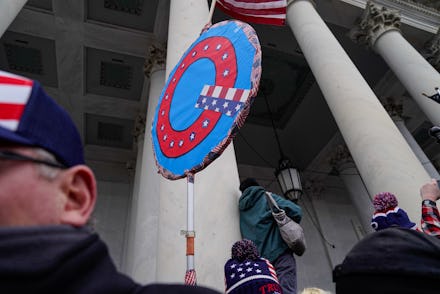The FBI thinks QAnon believers are about to get more violent

It's hard to see how a cult of conspiracy theorists who believe the world is controlled by a secret cabal of Satan-worshiping child murderers could get any worse than it already is. But according to a recently obtained FBI memo to Congress, that's exactly what the government believes is happening, as QAnon adherents move toward a new phase of their delusional narrative.
In a memo to lawmakers obtained by CNN on Monday, the FBI warns that QAnon followers have begun to doubt the conspiracy theory's de facto mantra to "trust the plan" and could, instead, start taking a more proactive stance against those they perceive as being involved in what QAnon describes as a nebulous world of child sacrifice and satanism.
"[QAnon followers] can no longer 'trust the plan' set forth by its mysterious standard-bearer, known simply as 'Q,'" the FBI threat assessment claims, adding that one outcome of this sort of disillusionment is the transformation of "digital soldiers" into something much more focused on offline violence. That means targeting "perceived members of the 'cabal' such as Democrats and other political opposition — instead of continually awaiting Q's promised actions which have not occurred."
The shift described in the FBI memo has come into acute focus in the weeks and months following the failed Jan. 6 insurrection and President Biden's subsequent inauguration — both of which ran counter to the supposed "storm" of consequences for the alleged cabal of Satan- worshipers hinted at by the conspiracy theory's eponymous Q. That disappointment has caused some former QAnon adherents to drift away from the movement.
"We gave it our all,” Ron Watkins, who ran a major QAnon message board, wrote shortly after Biden was sworn in. “Now we need to keep our chins up and go back to our lives as best we are able."
Still, the template established on Jan. 6 may give other QAnon followers a model for how to move forward as the movement struggles to re-establish itself.
"The participation of some domestic violent extremists (DVE) who are also self-identified QAnon adherents in the violent siege of the U.S. Capitol on [Jan. 6] underscores how the current environment likely will continue to act as a catalyst for some to begin accepting the legitimacy of violent action," the FBI's threat assessment, initially requested by New Mexico Sen. Martin Heinrich (D), stated.
"I think these people have given up too much and sacrificed too much in their families and in their personal lives," QAnon researcher and author Mike Rothschild told the Associated Press shortly after Biden assumed office. "They have believed this so completely that to simply walk away from it is just not in the realm of reality for most of these people."
If that's the case, then it's entirely possible that any defections from the movement will only serve to ossify the conspiracy theory's more hardcore believers. And with more and more QAnon followers working their ways toward real legislative power across the country, it seems safe to assume that the very real dangers this group represents are going to be with us for a long time to come.